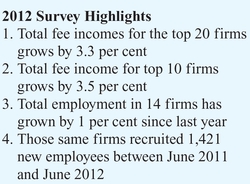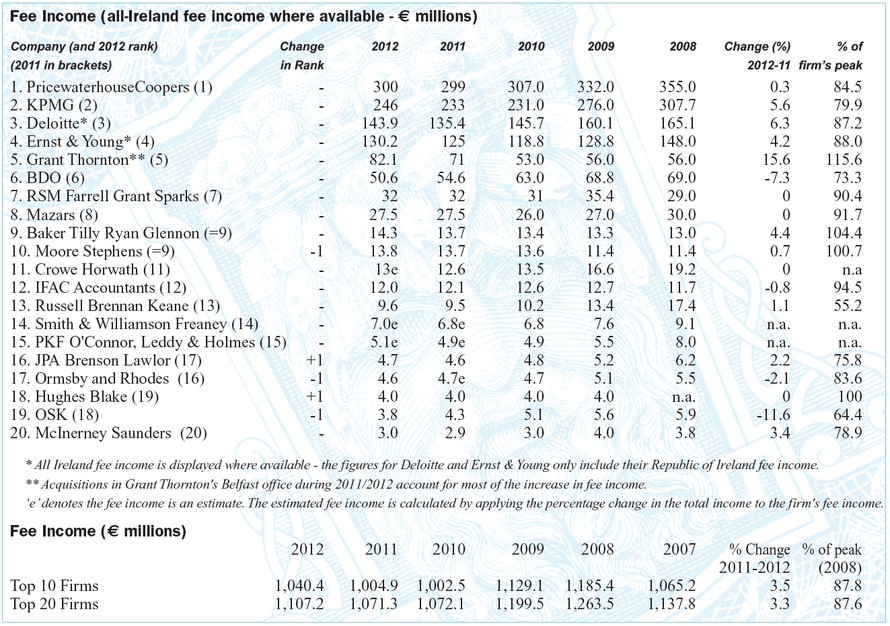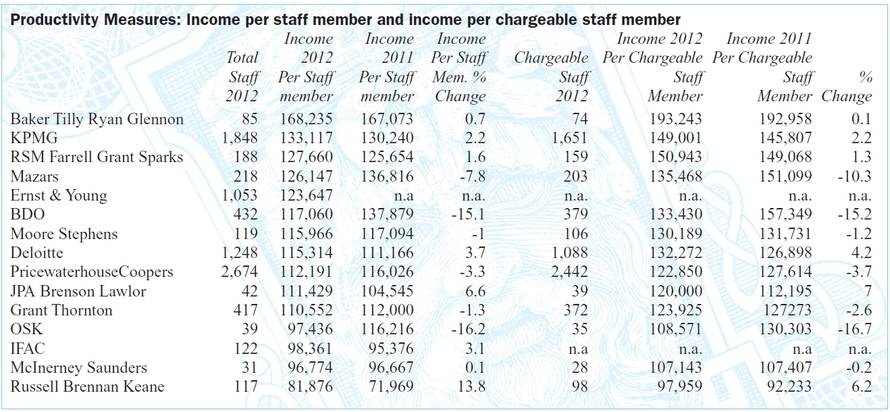In 2012 the Irish accountancy industry reversed the revenue falls seen every year since 2008. This year's survey shows a 3.3 per cent growth in fee income for the country's top twenty firms, at €1,107.2 million, up from 2011's €1,071.3 million. This represents a cementing of the revenue stabilisation seen in 2011, when fee incomes fell by just 0.1 per cent. Prior to this we saw a drop in revenues for two years running. In 2010-11, fee income fell by 10.1 per cent and in 2008-9 there was a drop of 5.1 per cent, which was the first recorded fall in the history of the survey. However overall fee income for 2012 is still some 12 per cent below the peak achieved in 2008.

All four of the largest accountancy firms reported growth in revenue this year. Deloitte in particular posted very positive growth earning €143.9 million, up 6.3 per cent. KPMG earned €246 million, up 5.6 per cent, while Ernst & Young's fee income rose to €130.2 million, up 4.2 per cent. Grant Thornton are however the stand out in this year's survey posting a dramatic increase of €11.1 million, an increase of 15.6 per cent from €71 million to €82.1 million. This follows a trend set by the firm in 2011 when it also led the survey with an increase in fee incomes of 34 per cent, from €53 million to €71 million. These increases are attributed by the firm to mergers and acquisitions activity in its Belfast operation.
Corporate recovery was identified as a particularly important activity by the managing partners surveyed this year. According to Terence O’Rourke of KPMG, ‘As in recent years we continue to see strong demand for our insolvency, restructuring and debt resolution services and this is likely to be the case for some time to come.’ John Glennon of Baker Tilly Ryan Glennon says ‘The corporate recovery market remains a significant contributor of fees to Baker Tilly Ryan Glennon. We have seen growth across all areas of the insolvency space, both corporate and more recently personal.’ He highlights five factors likely to continue this growth: new personal insolvency legislation; the creditors voluntary liquidation (CVL) market remaining strong; increased workload in corporate receiverships; significant increase in fixed asset receivership assignments coming from the various financial institutions as their focus is shifting to enforcing securities in place (personal guarantees etc.), and financial institutions facing into dealing with the mortgage arrears without the necessary skills or personnel in-house to deal with the volume involved. According to Mark Kennedy newly appointed co-managing partner at Mazars: ‘We have seen a significant increase in the number of organisations that are actively reaching out to us to get the advice they need to restructure their business and their debt to ensure the successful survival of their business into the future.’
Cost management remains a key focus for the clients of the accountancy firms. ‘In our advisory team we’re seeing an increased demand for services such as cost reduction, risk management and change management projects,’ says Mike McKerr of Ernst & Young.
The importance of foreign direct investment was also evident. ‘The internationally traded and FDI sectors as well as export based sectors continue to provide a steady flow of work as well as funds and asset management sectors based in the IFSC,’ says Ronan Murphy of PwC. ‘We recognise the importance, in a global economy, of the emerging economies, for example China. In response, we have launched our China practice earlier this year. Many of these countries are investigating opportunities to use Ireland as a platform to do business in Europe.’ ‘Against the backdrop of a challenging domestic economy, the FDI segment in Ireland remains resilient,’ says John Glennon. ‘Through our involvement in Baker Tilly International we have been able to attract a number of FDI projects into Ireland.’
This increase in FDI activity in Ireland, coupled with our Baker Tilly International membership, will be key to the growth of our practice over the next three years.’
Grant Thornton, who led the survey in terms of increases in revenues, highlights the food and beverage industry as a growing source of business for Ireland’s accountancy firms. ‘Food and beverage is a core sector of focus for Grant Thornton,’ says Paul McCann. ‘We continue to build our client base in this area, helped by the thought leadership of our head of food and beverage, Ciara Jackson, whose recent thought leadership seminar - Food 4.0 The Dynamics of Supply & Demand – was attended by over 100 companies.’
Other sectors identified as important include financial services, M&A, regulatory and actuarial services, R&D and transfer pricing services, technology, the renewable energy sector, corporate treasury, aircraft leasing, reward strategy, executive resourcing, pension advice, and the credit union, charity and medical sectors.


